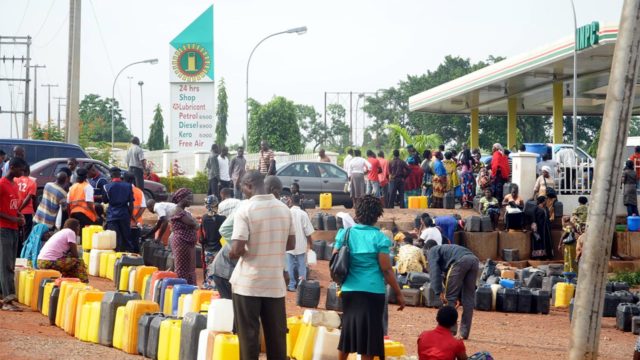News
Fuel Scarcity Hits Lagos As Queues Emerge In Filling Stations

Fuel shortage has reportedly begun in Lagos State, as long queues emerged in some filling stations on Monday.
Some filling stations, especially independent marketers, did not have the product to sell to motorists and other consumers, while those with commercial stocks increased their prices, ranging between N200 and N250 per litre, depending on location.
Confirming the development, the National Operations Controller, Independent Petroleum Marketers Association of Nigeria, IPMAN, Mr. Mike Osatuyi, attributed the scarcity to unsteady supply in the past few days.
He told Vanguard that as a result of the unsteady supply, depots prices had risen to between N175 and N180 per litre in Lagos and its environs.
He said; “The situation has culminated in higher prices at the depots. Our members, who find it difficult to get the product, pay between N175 – N185 per litre. Consequently, we are compelled to sell at higher prices in order to cover cost.”
The President of Independent Petroleum Marketers Association of Nigeria (IPMAN), Debo Ahmed had on Monday attributed the petrol scarcity in the Federal Capital Territory (FCT) and its environs on supply gap the blockade created.
The Nigerian Midstream and Downstream Petroleum Regulatory Authority ,NMDPRA, earlier said the current fuel scarcity in Abuja and other surrounding states is caused by the inability of fuel trucks to have access to Lokoja roads.
The regulatory body said the roads were flooded.
The agency, however, assured that there was enough fuel stock and therefore appealed to members of the public to avoid panic buying as all efforts were being made to resolve fuel shortage in some filling stations in Abuja and its environs.
According to a statement from the agency, the Lokoja flooding had affected the distribution of petroleum products to the Federal Capital Territory, Abuja, and environs as water had submerged a greater part of Lokoja city and grounded all vehicular movements, adding that as part of measures to mitigate the situation, “trucking via alternative routes is currently ongoing.”
But days after the flood receded, the scarcity of the petroleum product persisted in Abuja and its environs.
The IPMAN’s president in a statement has attributed the current scarcity to the break in supply of the product, stressing that there was a lot of product in the depots.
“They (suppliers) have to up their load from the depots to meet up because as it is coming, people are buying.
A lot of people are thinking there is still the issue (scarcity) so they will queue. It is not that there is no product, there is a lot of product in the depots. So, it is because of the break in supply of the product that is still causing the scarcity,” he noted. SaharaRepoeter
-

 News4 days ago
News4 days agoOsun 2026: Former SSG Adeoti, Thousand Of Supporters Declare Support For Adeleke
-

 News5 days ago
News5 days agoNigerians Cannot Afford Another Glitch: Fadojoe Insists on Real-Time Electronic Transmission of Election Results
-

 Education3 days ago
Education3 days ago150 CHEW & JCHEW Graduates of OSCO-HEALTH, Ilesa Inducted into Nigeria’s Community Health Practitioners Board
-

 News5 days ago
News5 days agoWhy Nigerians Fear Hospitals More Than Illness By Boluwatife Adedokun


